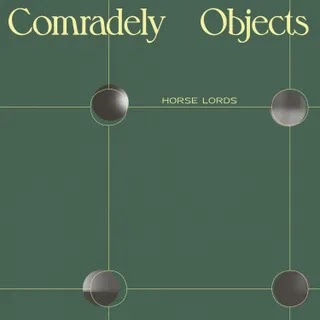On the group’s fourth album, carefully controlled minimalism gives way to a playful expressionistic streak, suggesting a utopian balance between social harmony and personal freedom.
It makes a certain sense that three of Horse Lords’ four members would decamp from Baltimore to Germany. Their relentlessly repetitive instrumentals owe an obvious debt to the West German art-rock bands of the 1970s, especially Neu! Beyond that surface-level similarity, they have a predilection for the formalized systems and brute functionality that govern all sorts of 20th century-German art: from the serialism of composers like Anton Webern, who ordered his seemingly chaotic miniatures according to extraordinarily precise rules, to the minimalism of designers like Walter Gropius, who taught a generation of followers that form should always follow function. Horse Lords, whose albums are filled with joyous and hypnotic grooves, aren’t nearly as difficult as Webern, or quite as spartan as Gropius. But like those two, they make art in which things happen for a reason. When they shift from one polyrhythm to another, it’s clear that some logic is at work, even if you can’t always apprehend its mechanics.
Yet they have a playful expressionistic streak as well, which has never been more pronounced than on Comradely Objects, their fourth album, recorded just before the transcontinental move. Take “May Brigade,” which begins in typical Horse Lords fashion. The bass, drums, guitar, and saxophone all sound like they could be playing in different meters, each offering a different short and simple ostinato. Somehow, the disarray coheres. You can marvel at the ingenious ways in which the lines bolster and accent each other, fitting like boards in an elaborate parquet floor. Or you can simply coast along on the rhythm they create together. This is what Horse Lords’ music does; the system is working as it should.
Then comes the rupture. Andrew Bernstein’s sax gets caught in a stuttering fit, breaking away from the rigid rhythmic grid. Soon he is full-on wailing, in free-jazz mode, conveying feral individual abandon instead of precise communitarian discipline. Owen Gardner follows suit, his guitar going from choked post-punk staccato to full-throated Pete Cosey psychedelia. Through these outbursts, the rhythm section keeps its cool, dutifully engineering modifications to the same restrained groove that opened the piece. On The Common Task, their previous album, Horse Lords began more overtly hinting at these tensions: between chaos and control, the expression of the individual and the community of the ensemble. They come to an apex on Comradely Objects. The effect is like a paint splatter across a sheet of graph paper.
The presence of a bona fide instrumental solo is an admittedly minor variation of the Horse Lords approach, but their music is all about minor variation, from measure to measure and album to album. Listeners who have struggled to appreciate previous releases will hear more of the same in Comradely Objects. Those who are attuned, who find that the band’s smallest pivots can induce a feeling approaching euphoria, will encounter the album as a carnival of delights. With guitar bouncing antically from one stereo channel to the other and an acid-house synth bassline that threatens to swallow the other instrumental tracks whole, “Mess Mend” would murder the right dancefloor, perhaps the first track of its kind for a band more likely to induce thinking about moving your body than actually doing it. “Zero Degree Machine” likewise indulges heartily in visceral pleasure, culminating with a guitar riff that’s like Mdou Moctar and Thin Lizzy meeting on the surface of a scratched and skipping CD.
Like the original krautrock bands, who often positioned their music as a liberation from the previous generation’s fascism, or a model for a utopian future, Horse Lords present theirs in expressly political terms. For a sympathetic listener, it’s possible to hear Comradely Objects as a catalog of ideal societies in miniature, with each voice working to support the others without losing the freedom of its own idiosyncrasy. Freedom only strengthens solidarity, and vice versa; neither ideal can exist without the other. Even “Plain Hunt on Four,” the Comradely Objects track that swings furthest toward rigorous collectivism, maintains this delicate harmony. Each instrument toils at two or three notes, offering fragments that would have little meaning on their own. Together, they form a tapestry of tiny changes. Appreciating it requires focused work from you as a listener, too: This is not a groove you can coast on. Zoom in and it flickers with activity; zoom out and it is austere to the point of bareness. For eight minutes, save for the nearly imperceptible shifts in each voice’s rhythmic relationship to the others, almost nothing happens.
Almost nothing. Every so often, a bit of white noise rises softly through “Plain Hunt on Four,” sounding like wind on leaves. This gesture has no easily articulable relationship to the rest of the music, otherwise so meticulously arranged. But it is beautiful in its way, and even more so for being essentially gratuitous: an offer of generosity and respite where neither was strictly required. Why is it happening? Surely those are reasons enough.



0 comments:
Post a Comment